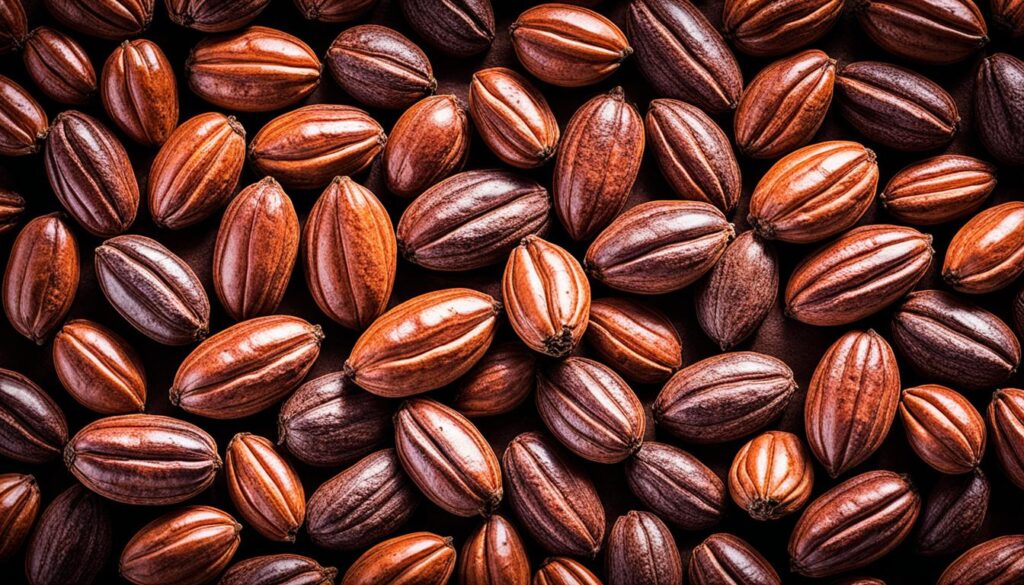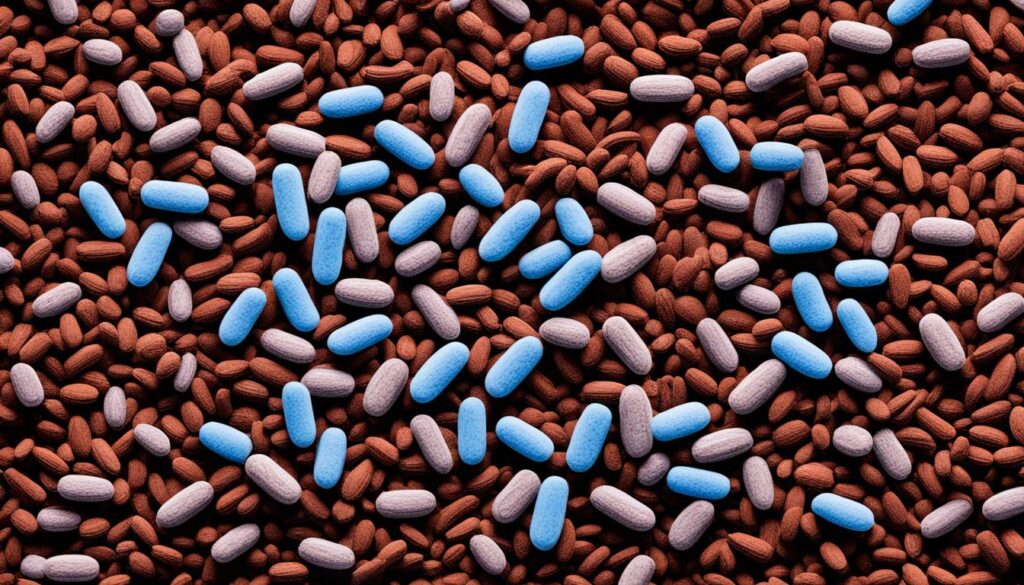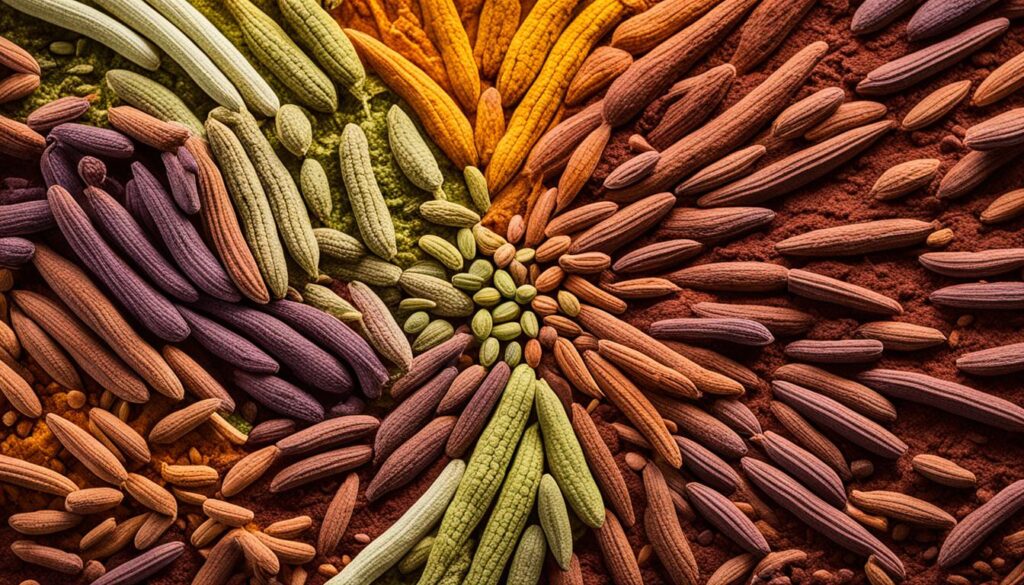Cocoa, a delectable superfood, has been the subject of extensive research regarding its impact on gut health and the microbiome. This article will delve into the fascinating relationship between cocoa consumption and the intricate ecosystem of the gut, exploring the various ways in which cocoa can influence the effects of cocoa on gut microbiota, cocoa and gut microbiota, impact of cocoa on gut bacteria, and how does cocoa affect the gut microbiome. By understanding the effects of cocoa on the microscopic world within our digestive system, we can gain valuable insights into the potential health benefits and practical applications of this beloved ingredient.
Key Takeaways
- Cocoa has been extensively studied for its impact on gut health and the microbiome.
- This article will explore the relationship between cocoa consumption and the gut ecosystem.
- Understanding the effects of cocoa on the gut microbiota can provide insights into the potential health benefits.
- Cocoa’s influence on the composition and diversity of gut microbiota is a fascinating area of research.
- Exploring the practical applications of cocoa’s impact on the gut microbiome is a key focus of this article.
Introduction to Cocoa and Gut Health
Cocoa, a beloved superfood, has been the subject of extensive research in recent years, particularly regarding its fascinating relationship with gut health and the microbiome. This section will provide an overview of the connection between cocoa and the intricate ecosystem of the human digestive system, exploring the unique properties of this versatile ingredient and its potential impact on the microscopic world within.
The Power of Cocoa
Cocoa, the key ingredient in chocolate, is a complex and multifaceted food that has captured the attention of scientists and health enthusiasts alike. Beyond its undeniable flavor, cocoa boasts a remarkable nutritional profile, rich in antioxidants, fiber, and a variety of bioactive compounds that may play a crucial role in supporting gut health and the gut microbiome.
Gut Microbiota: The Microscopic World Within
The human gut is home to a thriving community of trillions of microorganisms, collectively known as the gut microbiota or gut microbiome. These microscopic inhabitants play a vital role in various aspects of our health, from digestion and nutrient absorption to immune function and disease prevention. Understanding the importance of maintaining a balanced and diverse gut microbiome is essential as we explore the potential impacts of cocoa on this delicate ecosystem.
By delving into the connection between cocoa and the gut microbiome, we can uncover the remarkable ways in which this beloved ingredient can influence the health and well-being of the human body, setting the stage for a deeper appreciation of the power of cocoa and its role in supporting overall gut health.
What is Cocoa?

Cocoa, the key ingredient in chocolate, is a remarkable superfood that has captured the hearts and taste buds of people around the world. Derived from the Theobroma cacao tree, cocoa beans are the core of this beloved delicacy, offering a unique blend of flavors, aromas, and an impressive nutritional profile.
Origins and Production of Cocoa
The origins of cocoa can be traced back to Central and South America, where the Theobroma cacao tree has been cultivated for centuries. These tropical evergreen trees thrive in regions with warm, humid climates, producing pods that contain the coveted cocoa beans. The process of harvesting, fermenting, and drying these beans is a labor-intensive but essential step in the production of high-quality cocoa and chocolate.
Nutritional Composition of Cocoa
Beyond its captivating flavor, cocoa is renowned for its exceptional nutritional value. Cocoa beans are rich in a variety of essential nutrients, including fiber, protein, and a range of minerals such as magnesium, iron, and zinc. Additionally, cocoa is a potent source of antioxidants, particularly polyphenols, which have been linked to various health benefits.
The unique blend of nutrients and compounds found in cocoa make it a versatile ingredient with the potential to positively impact gut health and the microbiome. By understanding the origins, production, and nutritional composition of cocoa, we can better appreciate its profound influence on the delicate ecosystem of the human digestive system.
The Gut Microbiome: A Delicate Ecosystem

The human gut is home to a remarkable and intricate ecosystem known as the gut microbiome, composed of trillions of gut bacteria, fungi, and other microorganisms. These microscopic inhabitants play a crucial role in maintaining overall health and well-being, influencing various aspects of human physiology, including digestion, immune function, and even mental health.
Roles and Functions of Gut Bacteria
The gut bacteria that make up the gut microbiota are responsible for a wide range of important functions within the human body. They aid in the breakdown and absorption of nutrients, produce essential vitamins and short-chain fatty acids, and help to regulate the immune system. Additionally, certain gut bacteria have been linked to improved mental health and cognitive function, highlighting the complex and far-reaching influence of this delicate ecosystem.
Factors Influencing Gut Microbiota
The composition and balance of the gut microbiota can be influenced by a variety of factors, both internal and external. Diet, lifestyle, age, genetics, and even the use of medications can all play a role in shaping the gut microbiome. Understanding these factors is crucial for maintaining a healthy and diverse gut microbiota, which is essential for optimal gut health and overall well-being.
Cocoa and its Impact on Gut Bacteria

Delving deeper into the relationship between cocoa and gut health, researchers have uncovered the fascinating ways in which this beloved superfood can directly impact the composition and diversity of our gut microbiota. By understanding the mechanisms behind these effects, we can gain valuable insights into how cocoa consumption may promote a healthy and balanced gut microbiome.
Prebiotic Effects of Cocoa
One of the remarkable properties of cocoa is its prebiotic potential, which refers to its ability to selectively stimulate the growth and activity of beneficial gut bacteria. The high fiber content in cocoa, particularly the insoluble fibers like cellulose and hemicellulose, serve as a source of food for probiotic microorganisms, such as Bifidobacterium and Lactobacillus species. These prebiotic effects help to nurture a thriving and diverse gut microbiome, promoting overall digestive health and well-being.
Modulation of Gut Microbiota by Cocoa Polyphenols
In addition to its prebiotic properties, cocoa is also rich in polyphenols, a class of bioactive compounds known for their antioxidant and anti-inflammatory properties. These cocoa polyphenols have been shown to play a pivotal role in modulating the composition of the gut microbiota. By selectively inhibiting the growth of harmful bacteria while encouraging the proliferation of beneficial species, cocoa polyphenols can help to maintain a well-balanced gut ecosystem. This can have far-reaching implications for various aspects of health, from improved digestion to enhanced immune function.
| Effect | Mechanism | Potential Benefits |
|---|---|---|
| Prebiotic Effects of Cocoa | Cocoa’s high fiber content serves as a food source for beneficial gut bacteria, such as Bifidobacterium and Lactobacillus species. | Promotes a thriving and diverse gut microbiome, which can enhance digestive health and overall well-being. |
| Modulation of Gut Microbiota by Cocoa Polyphenols | Cocoa polyphenols selectively inhibit the growth of harmful bacteria while encouraging the proliferation of beneficial species. | Helps maintain a well-balanced gut ecosystem, with potential benefits for digestion, immune function, and reduced risk of chronic diseases. |
Health Benefits of a Balanced Gut Microbiome

Maintaining a healthy and diverse gut microbiome has been linked to a wide range of benefits that can have a profound impact on our overall well-being. By understanding the importance of gut health, we can appreciate the potential role that cocoa plays in promoting a balanced and thriving microbial community within our digestive system.
Improved Digestion and Nutrient Absorption
A balanced gut microbiome is essential for efficient digestion and the optimal absorption of essential nutrients. The diverse array of gut bacteria work in harmony to break down complex compounds, enabling the body to extract maximum nutritional value from the foods we consume. This not only supports overall digestive function but also enhances the body’s ability to utilize the health-promoting compounds found in foods like cocoa.
Enhanced Immune Function
The gut microbiome plays a crucial role in the development and regulation of the immune system. A well-balanced gut can help strengthen the body’s natural defenses, enabling it to ward off harmful pathogens and respond more effectively to potential threats. By supporting a healthy gut microbiome, cocoa consumption may contribute to improved immune function, reducing the risk of infections and bolstering overall health.
Reduced Risk of Chronic Diseases
Emerging research suggests that an imbalance in the gut microbiome, known as dysbiosis, may be linked to the development of various chronic diseases, including metabolic disorders, inflammatory conditions, and even certain types of cancer. By maintaining a balanced gut microbiome, individuals may be able to reduce their risk of these debilitating health issues, potentially enhancing their overall quality of life.
What are the effects of cocoa on gut microbiota?

Cocoa, the key ingredient in chocolate, has been the subject of growing interest in the realm of gut health and the microbiome. Numerous studies have explored the intricate ways in which cocoa can influence the composition and diversity of the gut’s microbial inhabitants, shedding light on its potential effects on digestive and overall well-being.
Cocoa’s Influence on Specific Bacterial Species
Research has indicated that the consumption of cocoa can selectively promote the growth of certain beneficial bacteria within the gut microbiome. The prebiotic compounds found in cocoa, such as dietary fiber and polyphenols, have been shown to stimulate the proliferation of probiotic bacteria like Bifidobacterium and Lactobacillus species. These bacteria play a crucial role in maintaining a healthy gut environment, aiding in digestion, nutrient absorption, and immune function.
Furthermore, cocoa’s influence on the gut microbiome extends beyond just promoting beneficial bacteria. Studies have suggested that cocoa consumption can also inhibit the growth of certain pathogenic or unwanted bacterial species, such as Clostridium and Escherichia coli, helping to restore the delicate balance of the gut ecosystem.
Potential Drawbacks and Considerations
While the evidence overwhelmingly points to the positive effects of cocoa on the gut microbiota, it is important to consider potential drawbacks and factors that may influence the relationship between cocoa and gut health. For instance, the processing and manufacturing methods used to produce cocoa-based products can affect the bioavailability and potency of the beneficial compounds, potentially diminishing their impact on the gut microbiome.
Additionally, individual differences in gut microbiome composition, dietary habits, and overall health status can also play a role in how an individual’s gut responds to cocoa consumption. It is essential to consider these individual factors and consult with healthcare professionals to determine the optimal amount and frequency of cocoa intake for maintaining a healthy gut microbiome.
By understanding the nuanced effects of cocoa on the gut microbiota, individuals can make informed decisions about incorporating this versatile ingredient into their diets, potentially reaping the benefits of a balanced and thriving gut ecosystem.
Incorporating Cocoa into a Healthy Diet

As the scientific evidence continues to unveil the beneficial effects of cocoa on gut health and the microbiome, it becomes increasingly important to understand how to properly incorporate this remarkable superfood into a balanced and nutritious diet. By making informed choices and striking the right balance, individuals can maximize the potential benefits of cocoa for their overall well-being.
Choosing High-Quality Cocoa Products
When it comes to incorporating cocoa into a healthy diet, the quality of the cocoa products you choose is paramount. Opt for high-quality, minimally processed cocoa powders, dark chocolates, or cocoa nibs that are rich in beneficial polyphenols and other essential nutrients. Avoid heavily processed or alkalized cocoa products, as they may have reduced concentrations of these beneficial compounds.
Balancing Cocoa Consumption
While the research on cocoa’s positive impacts on gut health is compelling, it’s important to consume cocoa in moderation as part of an overall healthy and varied diet. The recommended cocoa intake and cocoa consumption guidelines can vary depending on individual factors, such as age, overall health status, and personal preferences. As a general guideline, aim for a balanced cocoa consumption that provides the desired benefits without exceeding the recommended limits.
By carefully incorporating cocoa into a healthy diet and making informed choices about the high-quality cocoa products you consume, you can maximize the potential benefits of this remarkable superfood for your gut health and overall well-being.
Cocoa and Gut Health: Future Research Directions
As our understanding of the intricate relationship between cocoa and the gut microbiome continues to evolve, researchers are eager to explore new avenues of investigation. One promising area of future research involves the role of different cocoa varieties and their unique impacts on gut health.
Exploring the Role of Different Cocoa Varieties
Cocoa beans can be categorized into several distinct varieties, each with its own unique flavor profile and chemical composition. Emerging research suggests that these variations may have a significant influence on the gut microbiome, as the different polyphenols and other bioactive compounds present in each variety can selectively promote the growth and activity of specific gut bacteria. By delving deeper into the effects of different cocoa varieties, researchers can uncover personalized strategies for optimizing gut health through targeted cocoa consumption.
Personalized Nutrition and Gut Microbiome Analysis
As the field of personalized nutrition continues to advance, the role of the gut microbiome in shaping individual responses to dietary interventions has become increasingly recognized. Future research on cocoa and gut health may explore the potential for gut microbiome analysis to guide personalized recommendations for cocoa consumption, taking into account an individual’s unique microbial profile and its interactions with the bioactive compounds found in cocoa. This approach could lead to more targeted and effective strategies for leveraging the health benefits of cocoa for gut and overall well-being.
By exploring these exciting avenues of research, scientists can continue to expand our understanding of the intricate interplay between cocoa, the gut microbiome, and human health. As the field of personalized nutrition and gut microbiome analysis continues to evolve, the potential for cocoa to play a transformative role in supporting gut health and overall wellness becomes increasingly promising.
| Study | Key Findings |
|---|---|
| Over-Expression of Intestinal Alkaline Phosphatase (2021) | Attenuated atherosclerosis |
| Changes in Gastrointestinal Mucosa After Long-Distance Running (1992) | Observed changes in the gastrointestinal mucosa |
| Resistance Exercise and Gut Permeability (2022) | Increased gastrointestinal symptoms, markers of gut permeability, and damage in resistance-trained adults |
| Dietary Flavonoids and Cardioprotective Potential (2021) | Associated with cardioprotective potential and antioxidant effects |
| Curcumin Supplementation and Gastrointestinal Barrier Damage (2018) | Reduced gastrointestinal barrier damage and physiological strain responses during exertional heat stress |
| Polyphenol-Enriched Protein Powder and Exercise-Induced Inflammation (2013) | Influenced exercise-induced inflammation and oxidative stress in athletes |
| Resveratrol and Intestinal Inflammation (2023) | Attenuated high-intensity exercise training-induced inflammation and ferroptosis in the intestine of mice |
| Dark Chocolate and Muscular Damage (2018) | Positively modulated redox status and markers of muscular damage in elite football athletes |
| Cocoa-Derived Polyphenols and Platelet Activation (2022) | Investigated the role of cocoa-derived polyphenols in platelet activation and NOX2-mediated muscle damage in elite athletes |
Sources and Further Reading
Exploring the relationship between cocoa and gut health requires a deep dive into the scientific research and authoritative sources on this topic. To help you delve deeper, we’ve curated a selection of valuable resources that cover the effects of cocoa on gut microbiota, the latest scientific studies, and insights from leading health organizations.
Scientific Studies and Research Papers
For those interested in delving into the scientific evidence, we recommend the following peer-reviewed studies and research papers that explore the impacts of cocoa on the gut microbiome:
- Cocoa Polyphenols and Their Potential Benefits for Human Gut Microbiota
- Effects of Cocoa Flavanol Intake on Brain Function: A Review of Human and Animal Studies
- The Impact of Diet and Lifestyle on Gut Microbiota and Human Health
- Cocoa Polyphenols: Can We Exploit Their Neuroprotective Potential?
Authoritative Health Organizations
For a comprehensive understanding of the effects of cocoa on gut health, we also recommend consulting the resources and guidelines provided by leading health organizations:
| Organization | Relevant Information |
|---|---|
| United States Department of Agriculture (USDA) | The USDA provides valuable information on the nutritional composition of cocoa and its potential benefits for gut health. |
| World Health Organization (WHO) | The WHO has published guidelines and recommendations on the role of diet and nutrition, including cocoa, in maintaining a healthy gut microbiome. |
| Centers for Disease Control and Prevention (CDC) | The CDC offers insights on the importance of gut health and the potential impact of dietary factors, such as cocoa, on the gut microbiome. |
By exploring these sources, you can deepen your understanding of the scientific evidence and authoritative perspectives on the effects of cocoa on gut microbiota, further enhancing your knowledge and appreciation for this fascinating topic.
Conclusion
As we conclude our exploration of the remarkable effects of cocoa on gut microbiota, it’s clear that this beloved superfood holds the key to unlocking a healthier, more balanced gut ecosystem. The research we’ve examined has consistently demonstrated the prebiotic properties of cocoa, as well as the modulating influence of its polyphenols on the gut microbiome.
From improving digestion and nutrient absorption to enhancing immune function and reducing the risk of chronic diseases, the profound impact of a balanced gut microbiome cannot be overstated. And by incorporating high-quality cocoa into our diets, we can harness the power of this versatile ingredient to support and nourish the delicate microbial community within our gut.
As the scientific exploration of cocoa and gut health continues, the future holds exciting possibilities for personalized nutrition and a deeper understanding of the complex interplay between this superfood and the microscopic world of our gut. By staying informed and embracing the benefits of cocoa, we can take proactive steps towards optimal gut health and overall well-being.

Leave a Reply